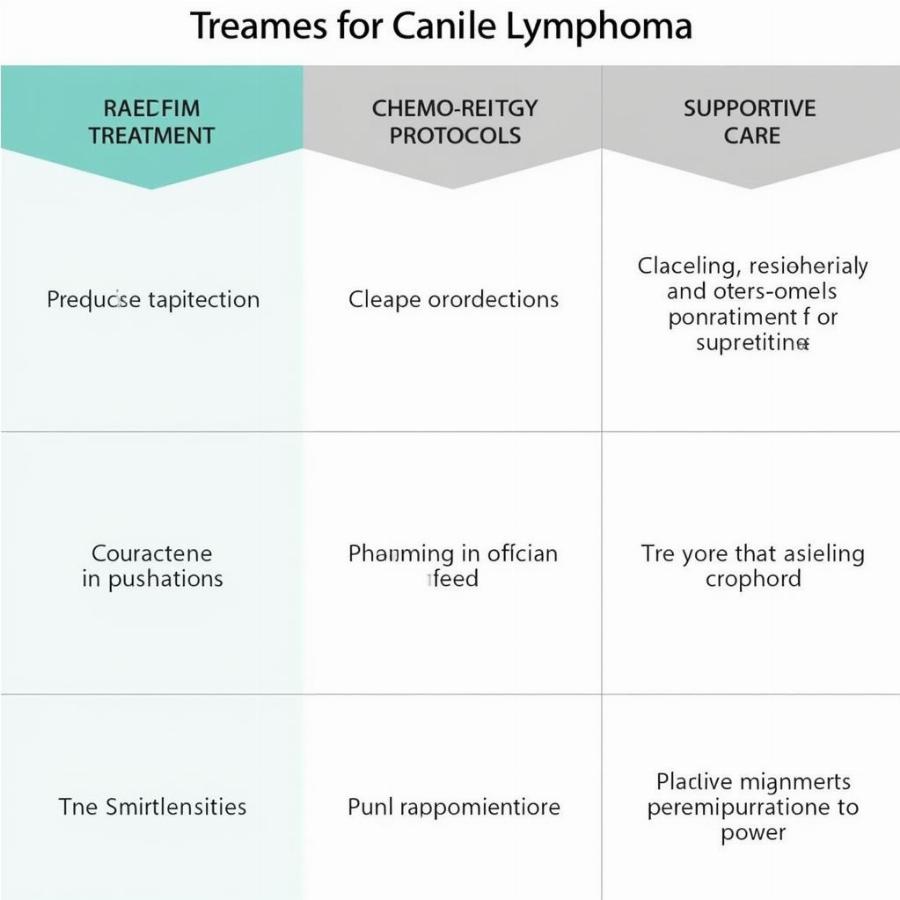Lymphoma in dogs is a common and often aggressive cancer affecting the lymphatic system. If your furry friend has received this diagnosis, understanding the lymphoma in dogs prognosis and available treatment options is crucial. This article provides comprehensive information to help you navigate this challenging time, offering insights into the various factors influencing prognosis and the latest advancements in treatment.
Factors Influencing Lymphoma in Dogs Prognosis
Several factors contribute to the prognosis of lymphoma in dogs. These include the dog’s age, overall health, specific type of lymphoma (B-cell or T-cell), the stage of the cancer at diagnosis, and the dog’s response to treatment. While a lymphoma diagnosis can be daunting, it’s important to remember that many dogs respond well to therapy and can achieve significant periods of remission.
Early detection and accurate staging are vital for determining the best course of action. Staging typically involves blood tests, lymph node biopsies, imaging studies (X-rays, ultrasound, CT scans), and sometimes bone marrow aspiration. Knowing the extent of the disease helps veterinarians tailor treatment plans and provide a more accurate prognosis.
Understanding B-cell and T-cell Lymphoma
The two main types of lymphoma in dogs are B-cell and T-cell lymphoma. B-cell lymphoma is generally more responsive to chemotherapy and often carries a better prognosis. t cell lymphoma in dogs tends to be more aggressive and may require more intensive treatment protocols.
What is the typical life expectancy for a dog with lymphoma? The answer varies depending on the factors mentioned above. Some dogs can achieve remission for several months to even years, while others may have a shorter survival time.
Treatment Options and Their Impact on Prognosis
Chemotherapy is the most common treatment for canine lymphoma. The specific protocol used will depend on the type and stage of lymphoma, as well as the individual dog’s health. Combination chemotherapy regimens are frequently used to target cancer cells more effectively.
 Treatment Options for Canine Lymphoma
Treatment Options for Canine Lymphoma
Are there alternative treatment options for lymphoma in dogs? While chemotherapy remains the cornerstone of treatment, some dog owners explore alternative therapies such as dietary changes, supplements, and holistic approaches. These options may be used in conjunction with conventional treatment to support overall well-being.
Palliative Care for Dogs with Lymphoma
For dogs with advanced lymphoma or those who are not candidates for aggressive treatment, palliative care focuses on managing symptoms and improving quality of life. This may involve pain management, nutritional support, and addressing any other complications that arise.
Monitoring Progress and Adjusting Treatment
Regular monitoring is essential during and after treatment. This typically involves blood tests, physical examinations, and imaging studies to assess the response to therapy and detect any signs of recurrence. Veterinarians may adjust treatment protocols based on the dog’s progress.
How often should my dog be monitored after lymphoma treatment?** The frequency of monitoring will depend on the specific case and the veterinarian’s recommendations. Initially, monitoring may be more frequent, and then it can be spaced out as the dog remains in remission.
Living with a Dog Diagnosed with Lymphoma
A lymphoma diagnosis can be emotionally challenging, but with the right information and support, you can provide your dog with the best possible care. Open communication with your veterinary team is crucial throughout the journey. Don’t hesitate to ask questions, express your concerns, and seek guidance on managing your dog’s condition.
Conclusion
Understanding the lymphoma in dogs prognosis and treatment options empowers you to make informed decisions for your beloved companion. While a lymphoma diagnosis can be difficult, advancements in veterinary medicine offer hope for remission and improved quality of life. By working closely with your veterinarian and staying informed about the latest treatment options, you can provide your furry friend with the best possible care and support during this challenging time. Early detection, accurate diagnosis, and tailored treatment plans are key to maximizing your dog’s chances of a positive outcome. spleen cancer dogs can be particularly challenging, so accurate diagnosis is crucial.
FAQ
-
What are the early signs of lymphoma in dogs? Enlarged lymph nodes, lethargy, loss of appetite, weight loss, and fever are some common early signs.
-
Is lymphoma painful for dogs? Lymphoma itself may not be painful in the early stages, but as the disease progresses, it can cause discomfort and pain.
-
How is lymphoma in dogs diagnosed? Diagnosis typically involves physical examination, blood tests, lymph node biopsies, and imaging studies. lymphoma cytology dog plays a crucial role in diagnosis.
-
What is the success rate of lymphoma treatment in dogs? The success rate varies depending on the type and stage of lymphoma and the individual dog’s response to treatment.
-
How can I support my dog during lymphoma treatment? Providing a comfortable and loving environment, ensuring proper nutrition, and managing any side effects of treatment are crucial.
-
What is the difference between B-cell and T-cell lymphoma? These are two different types of lymphocytes affected by the cancer. splenic mass dog may also indicate lymphoma. B-cell lymphoma generally has a better prognosis than T-cell lymphoma.
-
What is the cost of lymphoma treatment in dogs? The cost of treatment varies depending on the specific protocol used and the duration of treatment.
Exploring Further
You might also be interested in reading about elevated globulin in dogs.
Beaut Dogs: Your Trusted Source for Canine Information
Beaut Dogs is your go-to resource for all things dog-related. We provide reliable and insightful information to help you understand and care for your canine companion. From breed-specific details to health and training advice, we’re here to support you every step of the way. When you need expert assistance, reach out to us at [email protected] for detailed and accurate answers. Let Beaut Dogs help you navigate the wonderful world of dog ownership.